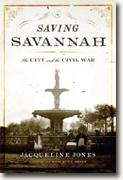Saving Savannah
Jacqueline Jones
book reviews:
· general fiction
· chick lit/romance
· sci-fi/fantasy
· graphic novels
· nonfiction
· audio books
· author interviews
· children's books @
curledupkids.com
· DVD reviews @
curledupdvd.com
newsletter
win books
buy online
links
home
for authors
& publishers
for reviewers

 |
Saving Savannah: The City and the Civil War Jacqueline Jones Knopf Hardcover 528 pages October 2008 |
|
Civil War students and enthusiasts interested on what life was like before and during the Civil War in the South will delight in this book about Savannah, Georgia, and the surrounding region. In Saving Savannah
Jones covers the social, economic, religious, and political sides of life of both black and white social strata in and around Savannah. Blacks, especially free blacks, had their own political systems and society; slaves also got involved in it if they could. Slaves were allowed to own some animals and do some gardening; some free blacks even owned a slave or two. Some bought their freedom by selling their own vegetables and other items they were free to accumulate after they had finished their work for their masters. When the Civil War came, Jefferson Davis’s central Confederate government found out that Georgia would absolutely not budge on states’ rights. The governor and other strong-minded Georgia politicians only grudgingly allowed some Georgia troops to fight outside of their home state since they believed that Georgia needed these troops to protect Georgia, not for them to be off in Virginia or elsewhere. Jones examines the lives of plantation families, families that lived in Savannah, and those who lived on small amounts of land, and she shows how free and enslaved blacks lived in Savannah itself. The city was dependent on overseas trade with Europe or with the North, so shipping played an important role in Savannah’s economy. Blockade runners came in and out of Savannah. The city also had a fort, Fort Pulaski, which the Union easily bombarded into submission to control Savannah’s harbor in conjunction with the North’s naval blockade. Saving Savannah Jacqueline Jones is a winner of the Bancroft Prize for her book Labor of Love, Labor of Sorrow (1985) and is the Harry S. Truman Professor of American History at Brandeis University. She is the author of the forthcoming fourth edition of Created Equal (2009), The Dispossessed (1992), Soldiers of Light and Love (1980) and other books. Saving Savannah Originally published on Curled Up With A Good Book at www.curledup.com. © Br. Benet Exton, O.S.B., 2008 |
|
|
|
 Click here to learn more about this month's sponsor! |
|
| fiction · sf/f · comic books · nonfiction · audio newsletter · free book contest · buy books online review index · links · · authors & publishers reviewers |
|
| site by ELBO Computing Resources, Inc. | |
 Savannah’s climate presented a major impediment to healthy living for both whites and blacks. Malaria, yellow fever and other diseases made living in Savannah and its environs a risky proposition. Slaves, of course, had no choice concerning where they lived. They were used for the hard, sweaty job of raising and harvesting cotton and rice. Slaves were valuable to their white masters, who left the hard labor to their slaves instead of them lowering themselves to that sort of work. Besides, the blacks seemed better equipped to work in those kinds of climates - at least that was the prevailing white opinion.
Savannah’s climate presented a major impediment to healthy living for both whites and blacks. Malaria, yellow fever and other diseases made living in Savannah and its environs a risky proposition. Slaves, of course, had no choice concerning where they lived. They were used for the hard, sweaty job of raising and harvesting cotton and rice. Slaves were valuable to their white masters, who left the hard labor to their slaves instead of them lowering themselves to that sort of work. Besides, the blacks seemed better equipped to work in those kinds of climates - at least that was the prevailing white opinion.